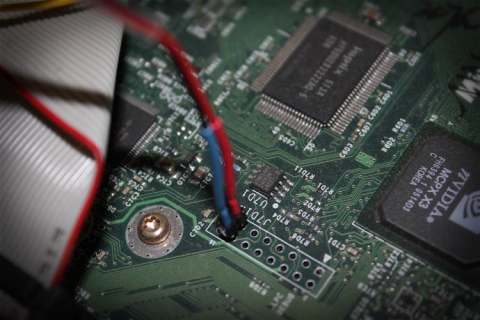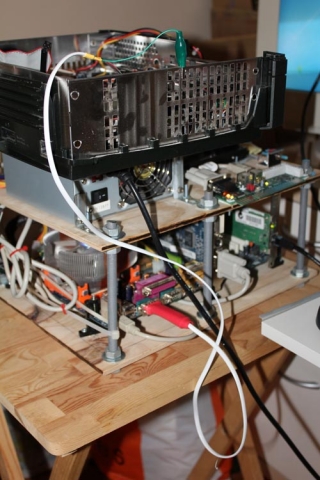Posted Thursday, 1st April 2010 under Random nostalgia
Comments Off on Seasonal gaming habits and associations
This one’s a little left-of-center, but I thought I’d post it anyhows.
I’ve found over the years that, just as musos will track periods of time in their lives or historical phases by the music associated therewith, I have begun over the years to do the same thing with video games. I see this happening on two levels, micro (annual seasons/events) and macro (periods of time).
The most recent/up-coming example of Micro Gaming Associations (let’s give it a fancy acronym – MiGA – yeah!) would be Easter. And it’s a completely irrational.
Back in March 1993, my brothers and I pooled our resources and sold off our Sega Master System, all our controllers (bar one or two we left behind, came in handy for 1-button games like Sonic or Sonic 2 on the Mega Drive) and all our games in order to pool the $300 for a Sega Mega Drive (original model, without the serial port though) pack that included Sonic 1 and vouchers to get Alex Kidd in the Enchanted Castle (boo!) and Columns (uber). I’ll leave the full, drawn-out story for a later post, but suffice to say we picked one up and come Easter, we had a Mega Drive, and it was the greatest thing to ever happen in the history of the universe to my pre-pubescent brain.
So, I still remember clearly on the morning of Good Friday, after partaking in copius amounts of hot cross buns (yum), I jumped in front of the telly and played – of all things – Michael Jackson’s Moonwalker. It was an awesome game in 1993, and while it’s probably a bit on the rubbish side, is still a lot of fun today. If you’re irrational like myself.
So, for the last couple of years I’ve gone to the habit of digging out Moonwalker and give the game a crack around Easter time because of the association with the season – in fact, if you check out my 10 April 2009 gaming session gallery, you’ll find a few pics from the first stage of Moonwalker 🙂 The same thing may happen this weekend 😀
Thus, when Easter comes around, you can count on me firing up the old 16-bit beast and having a crack at Moonwalker. But what about other seasons? Let’s have a think…
MiGA list:
- Seasons –
- Summer: Shenmue (Dreamcast), Asuka 120% Limited (Saturn), Wonderboy in Monster World (Mega Drive), Sonic 2 (Master System)
- Autumn: Michael Jackson’s Moonwalker (Sega Mega Drive), Super Mario All-Stars (SNES), Donkey Kong Country (SNES), Secret of Mana (SNES), Sonic 2 (Sega Mega Drive), Skies of Arcadia (Dreamcast), Ico (Playstation 2)
- Winter: Phantasy Star 4 (Mega Drive), Rocket Knight Adventures (Mega Drive), Ghostbusters (Mega Drive), TMNT: The Hyperstone Heist (Mega Drive), Zelda: A Link To The Past (SNES), Super Metroid (SNES), Dragon Force (Saturn), Magic Knight Rayearth (Saturn), Vampire Savior (Saturn), Saturn Bomberman (Saturn), Sonic 1 (Master System)
- Spring: Road Avenger (Mega CD), Sonic CD (Mega CD), Thuderhawk (Mega CD), Marvel Super Heroes vs Street Fighter (Sega Saturn), Panzer Dragoon (Saturn), Panzer Dragoon Saga (Saturn), Mortal Kombat (Mega Drive), Street Fighter 2: Special Championship Edition (Mega Drive)
- Holidays –
- Christmas: Shenmue (Dreamcast), NiGHTS (Saturn), Virtua Fighter 2 (Saturn), Story of Thor (Mega Drive), Sonic 2 (Master System)
- Easter: Michael Jackson’s Moonwalker (Mega Drive), Golden Axe 2 (Mega Drive), Sonic 2 (Mega Drive)
It’s a bit illogical and extremely inconsistent, but I thought I’d share anyhows 🙂
So what about Macro Gaming Associations (MaGA to keep things going) – for the purpose of my ranting and raving, I’ll use these to define where particular games emphasised or are representational of a period of years or within a particular generation of game systems. This one’s still a bit hazy/inconsistent compared to the former which I’ve spent more time thinking about, so bear with me for this more randomised list. Note that like the above, these are representational of my personal bias, hence why some systems/games aren’t represented and why some games that may have come out in other periods are represented out of date. Where games represent the period and were ported to numerous systems, I’ve placed them in favoured order of association. Thus, if a game came out on the C64 and arcade but I spent more time playing the C64 version, that gets preference, even if the arcade original was much better.
- Decades –
- 1980s: Asteroids (Atari 2600), Pitfall (Atari 2600), Enduro (Atari 2600), R-Type (Commodore 64, arcade), TMNT (Commodore 64 [platformer], arcade), International Karate (Commodore 64), The Last Ninja (Commodore 64), Bad Dudes vs Dragon Ninja (Commodore 64, Amiga 500, arcade), Wizball (Commodore 64), Combat School (Commodore 64), The Great Giana Sisters (Commodore 64), Bruce Lee (Commodore 64), Outrun (Commodore 64, arcade), Afterburner 2 (Commodore 64, deluxe hyrdraulic arcade cabinet), Wonderboy (Commodore 64), Space Invaders (cocktail arcade cabinet), China Gate (arcade)
- 1990s: Wing Commander (DOS), Space Quest 3 (DOS), Warcraft 2 (DOS), Police Quest 2 (DOS), Double Dragon 2 (NES), Super Mario Bros. 3 (NES), The Flinstones (NES), Advanced D&D Collection series (Commodore 64, DOS), Sonic 1-2 (Master System, Mega Drive), Wonderboy 1-3 (Sega Master System), Alex Kidd in Miracle World/Shinobi World (Sega Master System), Sonic 3 + Knucles (Sega Mega Drive), Gunstar Heroes (Mega Drive), Story of Thor (Mega Drive), Phantasy Star 2/4 (Mega Drive), Super Mario World (SNES), The Legend of Zelda: A Link to the Past (SNES), Secret of Mana (SNES), Panzer Dragoon Saga (Saturn), NiGHTS (Saturn), Guardian Heroes (Saturn), Saturn Bomberman (Saturn), Virtua Fighter 2 (Saturn), Sonic Adventure (Dreamcast), Soul Calibur (Dreamcast), Daytona 8-way linkup (arcade), Last Bronx (arcade, Saturn), Sega Rally 2 (arcade), X-Men vs Street Fighter (arcade, Saturn), Dead or Alive (arcade, Saturn), House of the Dead 2 (arcade, Dreamcast), Street Fighter 2/CE/HF/Super/Super Turbo (arcade), Metal Slug (arcade, Saturn), King of Fighters ’96 (arcade, Saturn), Crazy Taxi (arcade, Dreamcast)
- 2000s: Shenmue 1-2 (Dreamcast), Dead or Alive 2 (Dreamcast, arcade, Playstation 2), Skies of Arcadia (Dreamcast), Chu Chu Rocket (Dreamcast), Powerstone 2 (Dreamcast), Gauntlet Legends (Dreamcast), Ico (Playstation 2), Kingdom Hearts (Playstation), Viewtiful Joe (Gamecube), Tales of Phantasia (Gamecube), The Legend of Zelda: Wind Waker (Gamecube), Panzer Dragoon Orta (XBox)
- Generations (in order of preference/emphasised experience) –
- 8-bit: Atari 2600, Commodore 64, NES
- 16-bit: Mega Drive, SNES, DOS
- 32-bit: Saturn
- 128-bit: Dreamcast, Gamecube, Playstation 2, XBox
Like I said, irrational, huh?
I think a special point needs to be made on the inclusion of the PS2 and the whole 128-bit gen note above – it’s actually all to Wifey’s credit that I had a big love of the PS2 in the last generation, as I was irrationally opposed to it on principle (being a bit of a Sega fanboy :P), but it garnered quite the soft spot in the end. It was also the first time I’d been in a financial position to actually get use of all the consoles in a single generation, so it’s quite interesting in that respect.
To be honest, I think I like the first list based on MiGA better than the second, as I feel like I’m making more of a randomised, generated list of games tied to extremely large swaths of time with the MaGA list, and the former seems more personal in its choices… but then again, when I think back on time periods, those are the games that stand out, at least at the moment I’m writing up this post.
I’ll have a thorough chuckle if either of these concepts get picked up anywhere else, or how many people throw on the rose-tinted glasses and look back on their classic games like this. I suspect I’m not the only one, but at the same time I don’t think I have my finger on the pulse in any way.
Anywho, I hope you enjoyed that long-winded return to retro gaming blogging. I promise I’ll start getting back into regular posting from now on!





